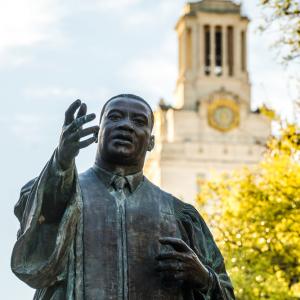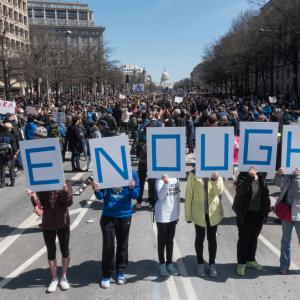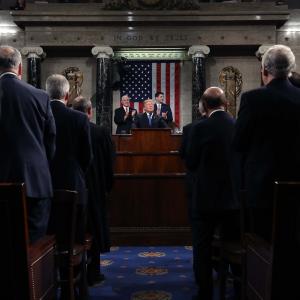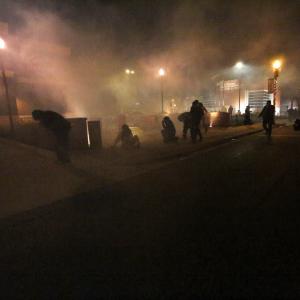
Rev. Dr. Guy Nave is professor of religion at Luther College in Decorah, Iowa, focusing on the topics of Christianity, the New Testament, and race. He received his Master of Divinity from Princeton Theological Seminary, and his Ph.D. in New Testament studies from Yale University. He also blogs for Luther College's Ideas and Creations page as well as the website Clamoring for Change where some of these posts also appear.
Posts By This Author
Creating Beloved Community Requires Accepting Responsibility for One’s Actions
While many Americans, especially white Americans, expect the police to protect their privileges, they often criticize police for the tactics used to protect those privileges. While people should indeed be appalled by racialized police violence, racialized policed violence is actually a symptom of the underlying pandemic of racism — a socially constructed malady designed to protect white privilege.
Half a Century Later, We Are Still a ‘Society Gone Mad on War’

Image via stock_photo_world/Shutterstock
While there is much to say about the ongoing prevalence of racism today, and the rampant materialism of American society, the third triplet is one that especially demands highlighting. It’s no accident that while many Americans each year praise King’s “I Have a Dream” speech, far fewer highlight his “Beyond Vietnam” speech.
A Holy Week Choice: The March of Empire or the March of Christ?

Image via Shutterstock/bakdc
As a follower of Jesus, I am acutely aware of the painful paradox represented by the fact that thousands of self-proclaimed evangelical Christians supported, and continue to support, our nation’s current president. These same evangelical Christians have historically resisted attempts to pass any sort of commonsense gun control legislation (although the tide is shifting).
Jonah, Trump, and the Perils of a Nationalistic View of God
The book of Jonah places the desire for retaliatory violence within the hearts of people (especially religious people) — rather than within the heart of God. It also promotes the idea of “God” as the divine ally of all people.
The Other Troubling Thing About Roy Moore’s Theology
Despite arguments regarding the meaning of the so-called “separation of church and state,” the U.S. Constitution does not prohibit the expression of religious belief. As many Christian conservatives correctly point out, the phrase “separation of church and state” does not even occur in the Constitution.
Americans’ Selective Memory Will Not Heal Racial Wounds
This year, America celebrates 241 years as a nation. And while racial and ethnic oppression has been a defining characteristic of the nation since the first colonists landed on the shores of this land, I hold out hope that because of her youth, America can change course.
A War on Racism?

Image via lassedesignen/Shutterstock
When will we as a nation develop the social, moral, or political resolve to declare a war on racism?
There is a long history in America of campaigns of eradication, identified as "wars" — a "war on crime," a "war on drugs," a "war on poverty," a "war on terrorism," etc.
An interesting commonality of many of these so-called "wars" is that the perceived enemy is often portrayed as people of color.
Why is it that we as a nation do not seek the ending of racism with the same urgency we have sought the eradication of crime, drug use, or terrorism? Is it because the perceived enemy in a "war on racism" is not primarily people of color?
24/7 Wall St. published a special report this month on the ten states with the most hate groups. Using data from the Southern Poverty Law Center, the report states that there are 784 active hate groups nationwide.
Christian Dominance and So-Called 'Religious Freedom'
While reflecting upon and celebrating Easter, I did quite a bit of thinking about the controversies surrounding so-called “religious freedom” bills that have been popping up recently, most notably Indiana and Arkansas. In a recent interview on the Family Research Council radio program, “ Washington Watch with Tony Perkins," former Arkansas Governor Mike Huckabee discussed the backlash against these two pieces of legislation.
Huckabee asserted that gay-rights activists are seeking the eradication of Christian churches. According to Huckabee, “It won’t stop until there are no more churches, until there are no more people who are spreading the Gospel.”
Christianity has been and continues to be the dominant form of religious practice and expression in America. Often the rhetoric used by members of dominant groups insinuates that when people outside of their dominant group ask for equal rights and the opportunity to participate fully in American life, they are actually seeking to eradicate the existence of that dominant group.
The Arctic National Wildlife Refuge and the Sanctity of All Life
Recently President Obama proposed giving wilderness status to 12 million acres of the Artic National Wildlife Refuge.
Many Republican senators, including Alaska Sen. Lisa Murkowski, strongly oppose the president’s proposal. Much of the opposition is expressed as frustration and outrage that the president is hindering Alaskans from having control over their economic future. Sen. Murkowski asserts:
What’s coming is a stunning attack on our sovereignty and our ability to develop a strong economy that allows us, our children and our grandchildren to thrive. … It’s clear this administration does not care about us, and sees us as nothing but a territory. … I cannot understand why this administration is willing to negotiate with Iran, but not Alaska. But we will not be run over like this. We will fight back with every resource at our disposal.
The ANWR is home to significant untapped petroleum reserves that lie beneath the land the president is seeking to protect. This fight between protecting the ANWR and promoting economic growth and development through oil drilling is one that has been going on between Democrats and Republicans for years.
Alaska Gov. Bill Walker said in a statement he may be forced to accelerate oil and gas permitting on state lands to compensate for the new federal restrictions.
While I believe I understand the arguments made by advocates on both sides, it seems to me there is a fundamental ideological (and possibly theological) premise that often goes unacknowledged in these debates.
Ferguson: A Question of Excessive Force
In a blog I wrote less than two weeks ago, “Justice ... not ‘Just Us’,” I asserted, “Our lives are constituted by relationships. The question is, ‘what is the nature of these relationships?’” I also asserted, “Exploitative relationships result in situations of ‘just us’ rather than justice.”
As I sat listening to Robert P. McCulloch, the St. Louis County prosecutor, return the grand jury’s decision to not indict Officer Darren Wilson for the fatal shooting of “Mr. Brown,” I kept waiting to hear comments regarding how or why Wilson was justified in firing several shots at an unarmed teenager.
After spending several minutes complaining about the news coverage and the use of social media, the county prosecutor began detailing the inconsistency of eyewitness testimony and the reliability of “physical and scientific evidence.” It was obvious at the outset that the prosecutor was setting the stage for the grand jury’s verdict by discrediting any and all witness accounts that suggested Michael Brown was surrendering or had his hands up before Wilson shot him several times.
While I was not surprised by the grand jury’s verdict, what I found disappointing in this case and continue to find disappointing in cases like this one, is the failure to discuss the use of “excessive force” by police. While giving his prepared remarks, McCulloch made no comments regarding Wilson’s use of deadly force against an unarmed 18-year-old man.
Justice … not ‘Just Us’
I am a professor of religion at a small liberal arts college in Decorah, Iowa. For the last two weeks in my Religion 239: Clamoring for Change course, students and I have been reading the book Occupy Religion: Theology of the Multitude. We have been discussing the issue of “justice,” and we have been playing with an image of God as one who works from the bottom-up on behalf of many rather than one who works from the top-down on behalf of a few.
A fundamental principle within this “bottom-up” theology is the idea of God taking sides (a view quite common in most of the “liberative” theologies). Many people, however, are often uncomfortable with the idea of God taking sides. They often assert that such an image contradicts the idea of an impartial and all-loving God who cares equally for all people.
A bottom-up theology of God asserts that God is a God who exists in relationship with all of creation at the same time every created thing is in relationship with every other created thing. While the relationships that involve human beings may be governed by several principles, I believe one principle that governs all human relationships is the principle of “justice.”
What Do Our Beliefs Say About Us?
Like many people, I was troubled when I heard about the recent shooting outside of a Jewish community center in Overland Park, Kansas. According to several news accounts, the perpetrator — Frazier Glenn Cross — yelled, “Heil Hitler” at onlookers as he was being carried away in a police car. Cross also has a long history of anti-Semitic behavior and has publically declared a hatred of all Jews.
In addition to being troubled by this act of hatred and violence, I was also troubled by the quick response of CNN Belief Blog Co-Editor, Daniel Burke, who made it a point to emphasize that Frazier was not a Christian but rather allegedly an adherent of Odinism, a “neo-pagan” religion which, according to Burke, “has emerged as one the most vicious strains in the white supremacist movement.”
While the annals of Christian history — ancient and modern — are full of accounts of violence perpetrated in the name of Christianity, my objective here is neither to defend Odinism nor to criticize Christianity. Instead, I want to highlight the socially constructed nature of beliefs and beliefs systems and emphasize how these socially constructed beliefs say far more about us than they do about the “gods” we claim to accept or reject.
What Good Is a Ph.D. for Reading the Bible?
When I was a Ph.D. candidate in Yale University’s New Testament program, I had the honor of preaching at an ordination service for a classmate who was being ordained as a Presbyterian minister. Following the service, a number of my classmates asked me why I wanted to spend four-seven years working on a Ph.D. in New Testament when I clearly had a "gift" for preaching. I responded that it was actually my academic study of the Bible coupled with my life experiences that illumined and enlivened my preaching.
I did not grow up reading the Bible. I was almost 19 years old and a U.S. Army soldier stationed in the Federal Republic of Germany when I purchased my first Bible. A series of life-changing events led to me "accepting Jesus Christ as my personal lord and savior." A few months after purchasing my first Bible, I attended a revival service at a local church. I returned to post that evening describing the service to fellow soldiers, who, along with myself, comprised a group self-identified as the "Soul Patrol." We were African-American Christians who strongly believed in the necessity of Christian evangelization.









